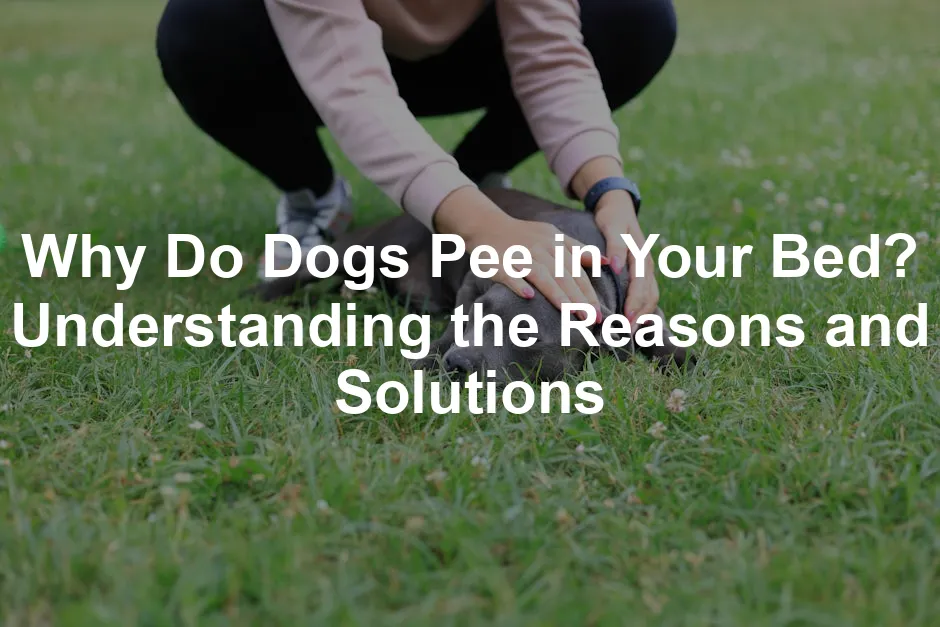
Why Do Dogs Pee in Your Bed? Understanding the Reasons and Solutions
Introduction
Have you ever come home to find your dog has urinated on your bed? This behavior can be baffling and frustrating for pet owners. Many wonder why their furry friend would choose such a special place. It’s often misunderstood, leading to confusion and stress. In this article, we’ll uncover the reasons behind this behavior. Plus, we’ll provide practical solutions to help you manage it effectively.
To help manage these unfortunate incidents, consider using dog training pads. These handy tools can make cleaning up after your furry friend a breeze, turning frustration into a quick fix!
Summary and Overview
Understanding why dogs pee in beds is essential for effective resolution. Various factors contribute to this behavior, such as medical issues, stress, and territorial marking. By exploring each potential cause, you can gain valuable insights. We’ll cover housetraining challenges, medical conditions, and behavioral factors. Additionally, we’ll discuss effective ways to address and prevent this issue.
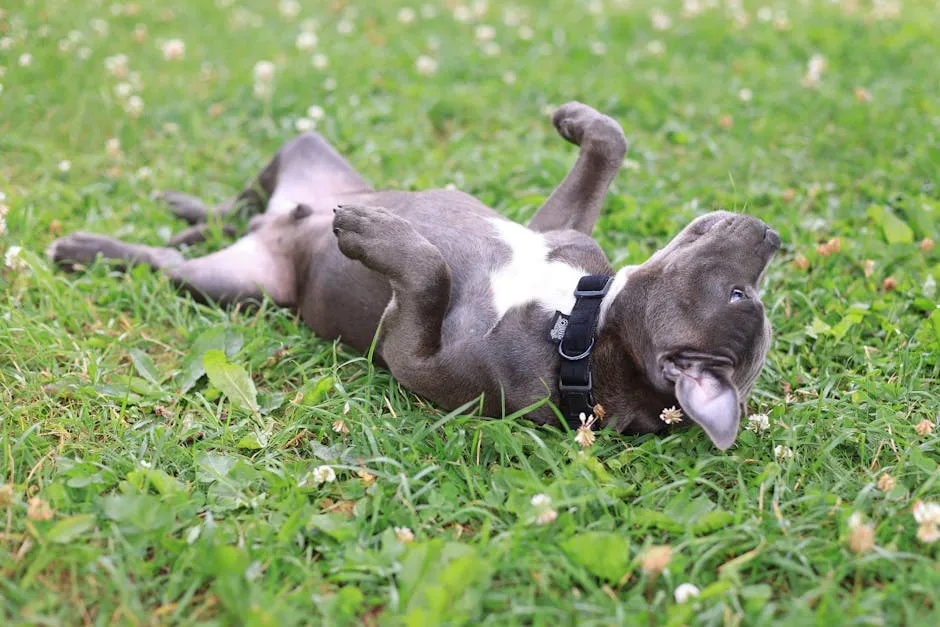
Understanding the Reasons Behind the Behavior
Housetraining Issues
Housetraining can be tricky, especially for young or rescue dogs. Many puppies need consistent guidance to learn proper potty habits. Accidents are common if they haven’t fully grasped where to go. Reinforcing training is vital to help your dog understand the rules. Regular potty breaks and rewards for good behavior can help solidify these habits.
Consider rewarding your pup with dog training treats to reinforce good behavior. These tasty rewards can motivate your furry friend to follow your lead and learn the ropes of housetraining!
Medical Conditions
Sometimes, bedwetting indicates an underlying health issue. Conditions like urinary tract infections (UTIs), bladder stones, or diabetes can lead to inappropriate urination. If your dog suddenly starts peeing in the bed, a veterinary evaluation is crucial. Early diagnosis can lead to effective treatment and prevent further accidents. Watch for symptoms like frequent urination or changes in appetite.
To help with any clean-up, an enzymatic cleaner for pet stains can break down odors and prevent your dog from returning to the same spot!
By understanding these factors, you can take the right steps to address and manage this behavior effectively.

Anxiety and Stress
Has your dog ever had an accident on your bed? It might not be as simple as you think. Stress or anxiety can lead to this behavior. Many dogs express their discomfort in surprising ways.
Signs of anxiety can include excessive barking, pacing, or hiding. If your dog is feeling anxious, they might pee where they feel safe—like your bed. Environmental changes often trigger this behavior. New pets, loud noises, or even changes in your routine can add to their stress levels.
Is your dog scared of fireworks or storms? These loud noises can overwhelm them. They may seek comfort in your bed but might lose control of their bladder. To help, create a peaceful environment.
Provide a safe space with familiar toys. Consider using calming products, such as an anxiety wrap or a pheromone diffuser for dogs. These products can work wonders to soothe your anxious pup!

Territorial Marking
Have you noticed your dog peeing on your bed? It could be a form of marking territory. Dogs often use urine to communicate and assert ownership. They might feel the need to mark their space, especially when they sense new scents or animals nearby.
If you’ve recently introduced a new pet, your dog might feel their territory is threatened. This instinct is strong in many breeds, particularly intact males. They may choose your bed due to its rich scent—filled with your familiar smells.
Marking behavior can be tricky to manage. Neutering your dog can help reduce this instinct. Training is also essential. Teach your dog that your bed is off-limits. Consistent boundaries can prevent this behavior over time.
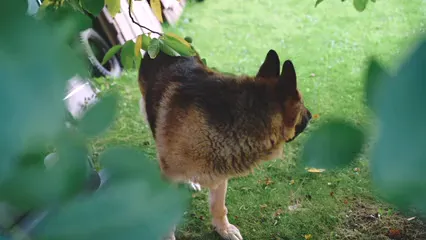
Aging and Incontinence
Are you sharing your bed with an older dog? As dogs age, they may develop incontinence. This condition can lead to unexpected accidents, even if they were once perfectly trained.
Cognitive decline can also play a role. Senior dogs might forget their training due to memory issues. Understanding these age-related changes is vital for compassionate care.
If your older dog is having accidents, consult your veterinarian. They can assess your dog’s health and suggest solutions. Products like dog diapers or waterproof bedding can help manage incontinence. Prioritize your dog’s comfort as they age. A supportive environment can make a big difference in their quality of life.
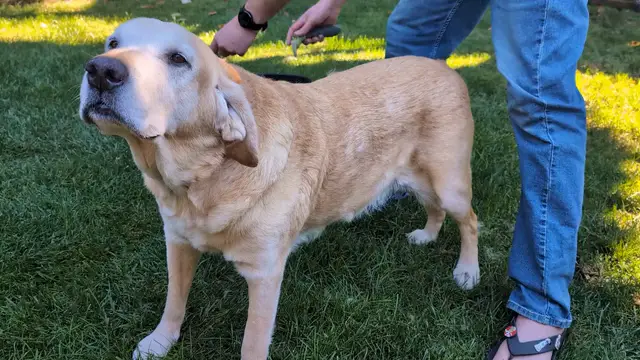
How to Address the Issue
Consult a Veterinarian
If your dog is peeing in your bed, it might be time for a check-up. A veterinary consultation can help identify any underlying medical issues. During your visit, expect a thorough health assessment. Your vet may conduct a urinalysis to check for infections or other problems. If necessary, they will discuss treatment options tailored to your dog’s needs. Regular dog health checks are vital, especially if you notice sudden changes in behavior. Don’t wait too long; early intervention can make a big difference.
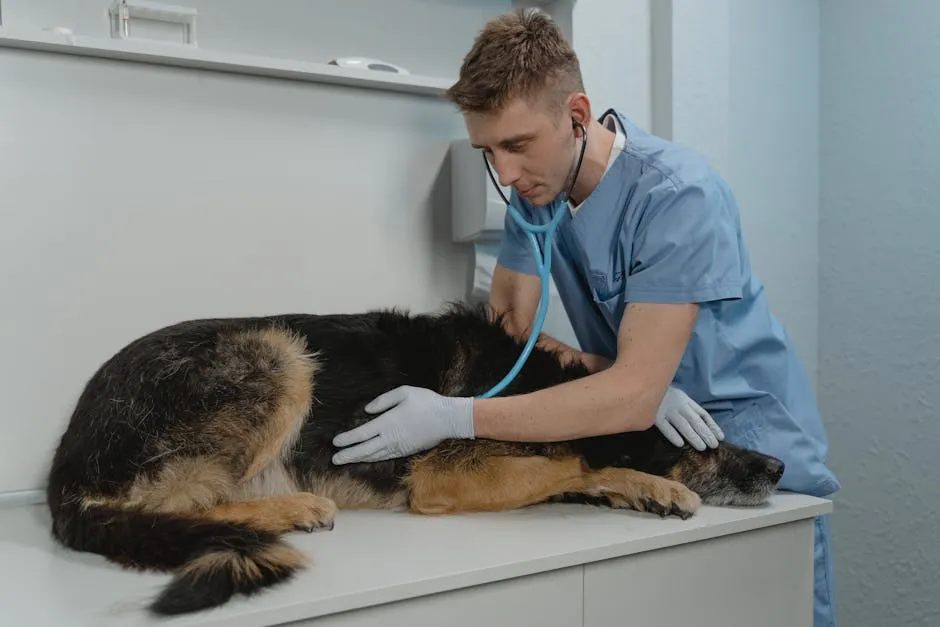
Reinforce Housetraining
Housetraining might need reinforcement if your dog has accidents. Start by creating a consistent potty schedule. Regular breaks can help your dog understand when and where to go. Always reward good behavior with praise or treats. This positive reinforcement encourages them to repeat the desired actions. If accidents happen, avoid punishment; instead, focus on retraining. Consider limiting access to areas where they’ve previously had accidents until they regain good habits. Consistency is key in reinforcing proper potty training.
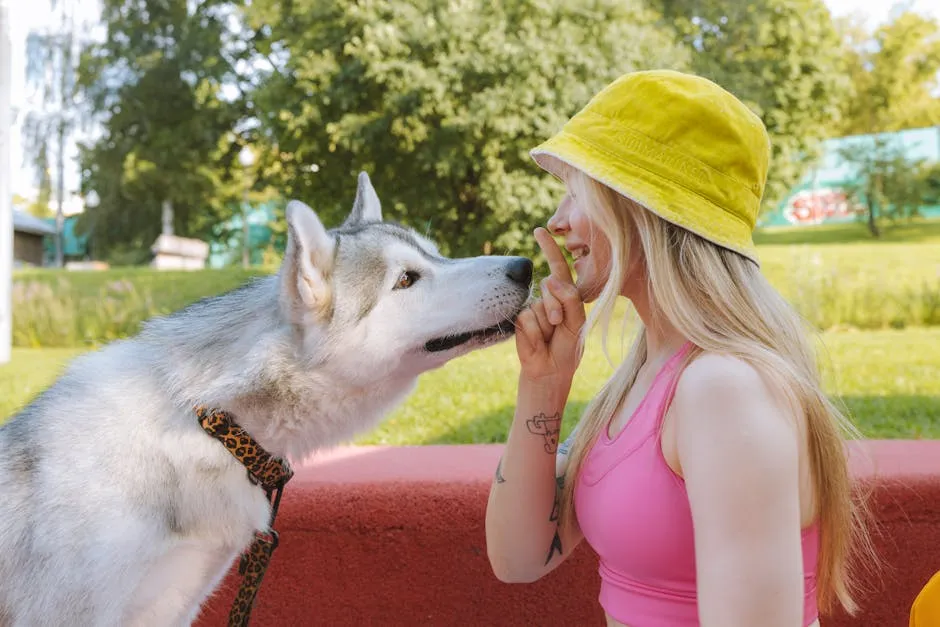
Manage Anxiety and Stress
Creating a calm environment for your dog significantly reduces stress-related urination. Regular routines can help your dog feel secure and comfortable. Consider incorporating mental stimulation through interactive dog toys or dog puzzle toys to keep your dog engaged. If your dog shows signs of anxiety, such as pacing or excessive barking, address these triggers. Providing a safe space with their favorite toys can also help them feel at ease. Calming techniques like anxiety wraps or pheromone diffusers may further support your dog’s emotional well-being.

Prevent Access to the Bed
If your dog has a habit of peeing on your bed, it’s crucial to limit their access during training. Start by closing the bedroom door when you can’t supervise them. This simple step can help prevent accidents.
Consider using baby gates to create a barrier. This way, your dog can’t enter the bedroom without your permission. Crates are also effective training tools. When you leave the house, place your dog in a crate. It’s a safe space that can help them feel secure.
When you’re home, allow supervised access to the bed. If your dog jumps up, gently guide them back down. Consistent boundaries reinforce that the bed is a no-go zone. With time and patience, your dog will learn to respect these rules.

Proper Cleaning Techniques
Accidents will happen, so knowing how to clean them up is essential. Start by removing all bedding and washing it in hot water. This helps eliminate any lingering odors.
To tackle the spot on the mattress, blot the area with paper towels. Don’t rub, as this can spread the stain. Next, use an enzymatic cleaner. These products break down the urine and neutralize odors effectively. Follow the instructions on the cleaner for the best results.
After applying the cleaner, let it sit for a few minutes. Then, blot the area again with clean towels to absorb the moisture. If any stains remain, repeat the process until satisfied. Keeping your bed fresh can help prevent repeat incidents.

Preventing Future Incidents
To reduce the chances of your dog peeing on your bed again, consider protective measures. Using waterproof bedding or covers can be a game changer. These solutions protect your mattress and make cleaning easier.
Routine cleaning is equally important. Regularly wash your dog’s bedding and any blankets they use. This helps maintain a fresh environment. Additionally, consider using pet-friendly cleaning solutions. These products are safe for your dog and effective in keeping your home clean.
Creating a comfortable space for your dog is key. Ensure they have their own bed or blanket nearby. This encourages them to use their space instead of yours. With these strategies, you can nurture a clean, happy home environment for both you and your furry friend.
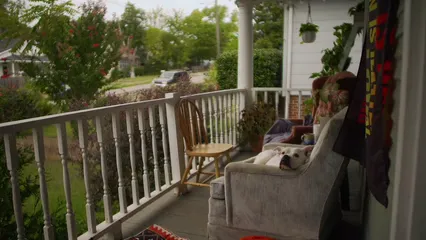
FAQs
Why does my dog pee on my bed?
Dogs may urinate on your bed for several reasons. Anxiety, marking territory, and medical issues like UTIs can lead to this behavior. It’s crucial to observe your dog’s habits and consult a veterinarian if needed.
Is it a sign of dominance when a dog pees on the bed?
This is a common misconception. Dogs usually do not pee on the bed to assert dominance. Instead, they may be reacting to anxiety or marking their territory.
How can I stop my dog from peeing on my bed?
Start by reinforcing housetraining, managing stress, and limiting access to the bed. Consistent supervision and positive reinforcement can also help retrain your dog.
What should I do if my dog suddenly starts peeing on my bed?
If this behavior is new, consult your veterinarian. Sudden changes can indicate health issues that require attention and treatment.
Are there any specific breeds more prone to this behavior?
While no specific breeds are more prone, individual behavior varies greatly among dogs. Factors like age, training, and environment play a significant role in this behavior.
Additional Resources
For further reading, check out articles on dog behavior and health. Consider pet training programs or veterinary services for expert guidance. Don’t forget to explore dog care books for more insights!
Please let us know what you think about our content by leaving a comment down below!
Thank you for reading till here 🙂
All images from Pexels




